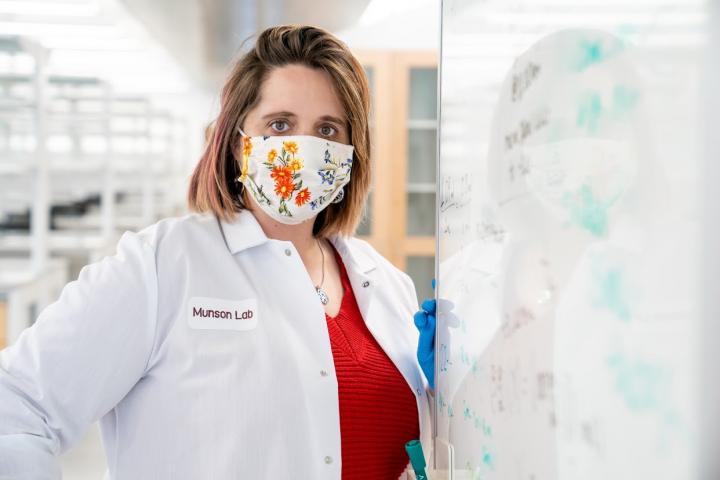Fralin Biomedical Research Institute at VTC explore new Alzheimer’s approach

Credit: Virginia Tech
Scientists don’t fully understand what causes Alzheimer’s disease, but they have a primary suspect.
Certain forms of a protein called amyloid beta that accumulate in the brains of patients with the debilitating form of dementia, disrupting communication between brain cells and eventually killing them has been implicated as one possible contributor to Alzheimer’s disease.
So far, researchers haven’t found an effective treatment for the disease or its symptoms.
But Jennifer Munson, associate professor at the Fralin Biomedical Research Institute at VTC, believes when brain fluid movements slow down, it could allow the plaques to build up. Speeding up that fluid flow could help flush out the protein that may contribute to limiting the damage that occurs in the disease.
The National Institute on Aging, part of the National Institutes of Health, has awarded Munson and a team of Virginia Tech scientists $3.57 million to test this hypothesis over five years.
Learning how fluid movements in the brain may affect the development of Alzheimer’s could help predict, diagnose, and treat the disease that, according to the Alzheimer’s Association, currently affects more than 6 million Americans. Cases are expected to double by 2050.
While previous studies have looked at the connection between bulk fluid flow – through blood vessels and the brain’s fluid-filled ventricles – and Alzheimer’s, less is known about the importance of interstitial fluid flow – the movement of liquid through human tissues in the spaces between cells.
The Virginia Tech team will provide the first real-time analysis of the potential link between this type of fluid flow and Alzheimer’s disease, and test flow acceleration methods as a possible therapy.
“We basically create a sink,” Munson said. “We’re moving flow by having a bigger outlet.”
To adjust the rate and volume of flow, the team will try to use drugs that are already clinically approved for other uses, which can mean a faster pathway to clinical use if they’re successful, Munson said.
The researchers will use live organisms and tissue engineered models developed by Munson’s lab, and imaging techniques Munson’s team has developed for studying fluid flow in brain tumors. Munson is one of a handful of researchers worldwide who focus on interstitial fluid flow.
In addition, the study will determine the role of a molecule that’s been identified in cancer, but which also appears in brain cells called astrocytes in Alzheimer’s disease, to see if it can be manipulated to reduce the cognitive effects of the disease.
Munson, who also is an associate professor in the Department of Biomedical Engineering and Mechanics in the College of Engineering, is the principal investigator on the team that also includes:
— Ian Kimbrough, assistant professor in the Virginia Tech College of Science’s School of Neuroscience, and an expert in imaging live organisms to study neurological diseases.
— Michelle Olsen, associate professor in the School of Neuroscience, who studies the role of astrocytes in the central nervous system.
–Michelle Theus, associate professor in the Virginia-Maryland College of Veterinary Medicine’s department of biomedical sciences and pathobiology, who will research the study’s behavioral outcomes and lend expertise on the brain’s vessel system.
###
Media Contact
Whitney Slightham
[email protected]
Original Source
https:/




